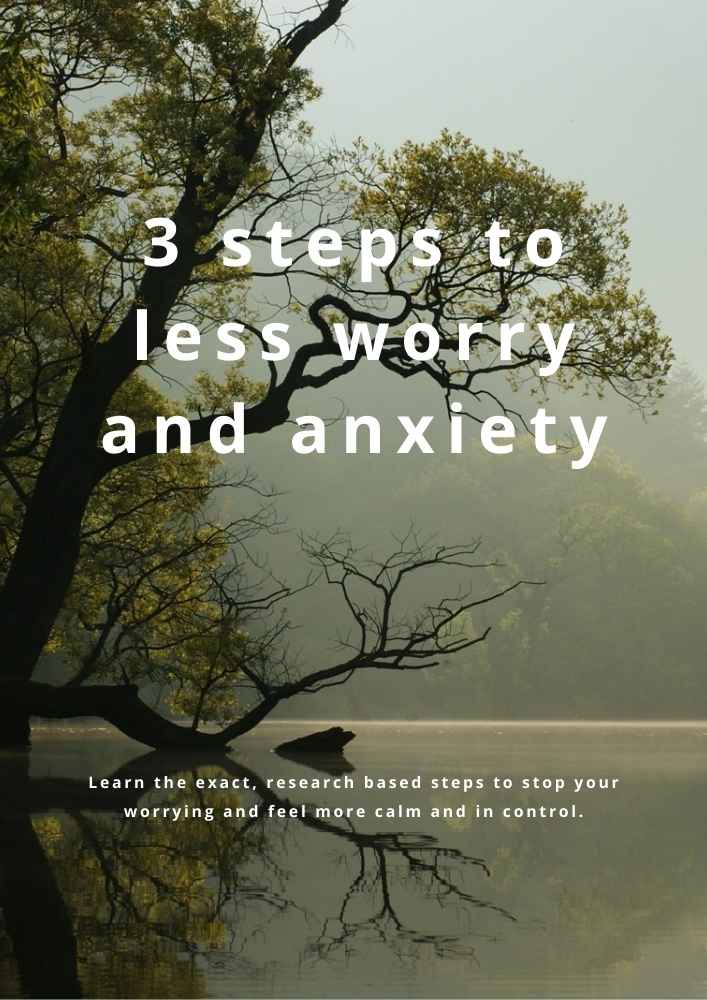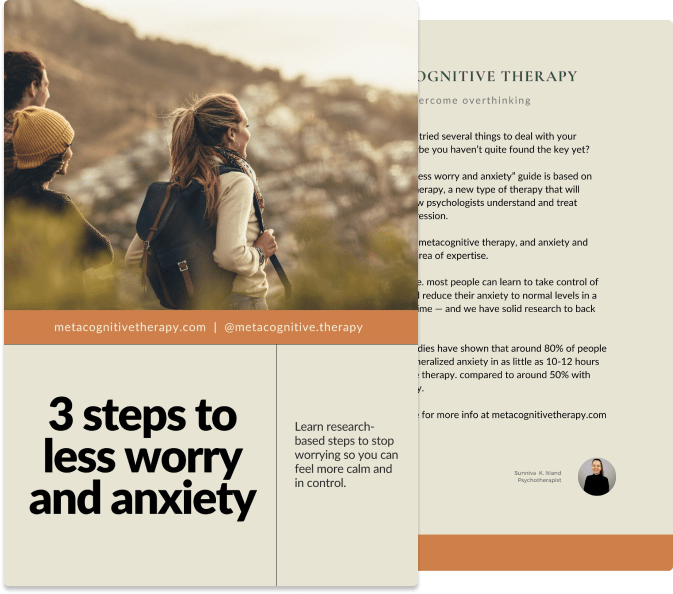Why trying to “fix” your self-esteem might be making your confidence worse

Download our best tips on reducing anxiety and worrying
Learn three powerful metacognitive therapy steps to stop the worry cycle, reduce anxiety, and feel calmer in everyday life.
.jpeg)
.jpeg)
We’re constantly told that confidence is something we should build. The self-help world is full of advice on positive self-talk, affirmations, and rewriting your negative thoughts in a quest to finally “feel good enough”.
But what if all that self-work (while well-intentioned) is actually part of what’s keeping you stuck in low self-esteem?
Metacognitive Therapy (MCT) takes a totally different approach to confidence and self-worth. Instead of trying to add more positive thinking or self-affirmation, it looks at why we’re spending so much time “doing the work” and thinking about ourselves, and how that excessive self-focus can backfire.
Is self-esteem a fixed trait?
We tend to think of self-esteem as something we either have or don’t, or as a muscle that we have to build. But research shows that self-esteem naturally fluctuates for everyone. Some days, you feel confident, capable, and attractive; others, not so much. These ups and downs are completely normal.
People who don’t struggle with persistent low self-esteem still experience those fluctuations, they just don’t obsess over them. So the issue arises when we treat feelings of low self-esteem as a problem that we must “fix” by constantly analyzing what’s wrong, comparing ourselves to others, or searching for the cause of our insecurity.
The paradox? The more you focus on improving or solving your confidence issues, the more you feed the cycle of low self-esteem.

Download our best tips on reducing anxiety and worrying
Learn three powerful metacognitive therapy steps to stop the worry cycle, reduce anxiety, and feel calmer in everyday life.
When self-improvement becomes a pattern of self-criticism
Our modern culture glorifies self-optimization. We’re encouraged to constantly improve our appearance, success, wealth, and wellbeing. But when that stems from the belief that something is wrong with you, it can turn into constant self-criticism.
“If I just lose weight… if I get that promotion. If I learn to love myself… I’ll find love.” Even when we meet those goals, there’s always another flaw for us to fixate on. In MCT, this endless loop is called rumination: the mental habit of dwelling on your flaws, replaying mistakes, comparing yourself to others, and analyzing your worth.
It’s not the content of those thoughts that keeps you stuck, it’s the amount of time you spend engaging with them.
Many people also use self-hate as motivation, believing a harsh inner voice keeps them accountable and driven. This only fuels low self-mood, hopelessness, and excessive self-monitoring.
Can you “perform” your way out of low confidence?
Another common trap is believing that you’ll achieve confidence through success or by levelling up your life, appearance, or status. But it’s not your performance that’s keeping your self-esteem low… it’s your thinking style. Think about it: people with stable self-esteem don’t really need constant reassurance or proof of their worth. They just spend less mental energy analyzing it. It’s about learning to disengage from the self-focused monitoring of, “Am I good enough yet?”
The goal of Metacognitive Therapy
In MCT, you don’t have to replace every negative thought with a positive one. (Trying to do that is an endless pursuit that just makes things worse.) Instead, the goal is to spend less time thinking about yourself altogether.
The key is recognizing that our self-critical thoughts are fleeting, and will pass on their own if we stop engaging with them.
Doing less might actually help you feel better
The MCT approach challenges one of our biggest cultural myths: that confidence comes from endless self-work. So it can be surprising to hear that doing less might be the answer. But by spending less time analyzing your worth, correcting your self-talk, or chasing new habits, you create a more stable and neutral sense of self that doesn’t need constant fixing.
Instead of fixating on confidence, try redirecting your focus outward. Pay attention to what’s happening in the moment rather than what’s happening in your head. Let lower confidence days come and go without assigning them meaning.
Self-doubt and dips in confidence aren’t signs that something’s wrong with you. They’re normal fluctuations of the mind that don’t need to constantly be solved. So the next time you feel not good enough, try doing less with your thoughts, and see if you can go out and continue with your day, even when doubts crop up.
Curious if Metacognitive Therapy can help you on your mental health journey? Take our quiz today to find out.



